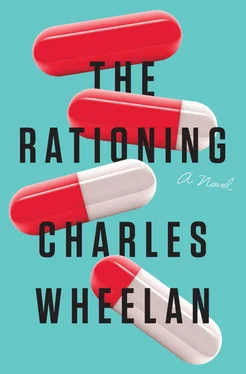“We’re not going to have an American Hiroshima,” the President said firmly. There was another long silence, during which many of us did the math. For all the Speaker’s hyperbole, her Hiroshima comparison was not wildly off base.
“Telling people could make it worse,” the Strategist said, as if he were thinking out loud. “Yes, it probably would.”
“Says you?” the Speaker challenged.
“Anyone with the sniffles would rush to get a prescription,” the Strategist explained.
“We’d blow through our Dormigen stocks even faster,” the Chief of Staff said, “and a lot of it would be wasted.”
“I’m sure the nation will be grateful to you for keeping them uninformed,” the Speaker said bitterly.
“Where are we on the virus?” the President snapped. Before the NIH Director could answer, he continued, “The brightest minds in the country can’t do better than this? We’re going to sit here tomorrow morning and try to decide whether Americans are going to die, or if we’re going to go hat in hand to Beijing and cede half the world to an authoritarian regime. That’s a shitty decision that I really don’t want to have to make. Give me something better.”
The goodwill in the room had dissipated quickly. The President stared at the NIH Director, though it was not clear if he was expecting a response. She offered one in any event. “We have a complete genetic sequence of Capellaviridae ,” she said. “We have a medical team working around the clock to test treatments other than Dormigen. As soon as we finish here, Max is headed to New Hampshire to speak to one of the world’s foremost virologists.” The heads around the table turned toward me. I had said virtually nothing in these meetings, other than answering the occasional technical question, or passing along requests to the research teams.
“Why weren’t you talking to this guy last week?” the President asked.
It was clear I had to say something, but my tongue felt awkward and I had the sensation of looking down on myself in the Cabinet Room, struggling to formulate an answer. I am no great athlete, but I played enough Little League to know what it feels like to choke, the physical sensation of the body tightening up in the moment when it needs to perform some task that should be simple, but for the pressure: throwing from shortstop to first base with two outs or tapping in a two-foot putt to win a match. I understood the physiology; I had read articles on it in graduate school. Now I had that choking feeling, struggling to form a basic sentence. By thinking about the act of speaking, as opposed to just answering, the act became all the more difficult. It was as if someone had pushed me onto a stage in front of ten thousand spectators and said, “Tell them a joke. And make it funny .”
The silence probably felt longer than it was. The NIH Director cocked her head slightly, as if to indicate, “Say something.”
“Viruses are like criminals,” I began. “We piece together clues that explain how they operate, why they do what they do. As the clues accumulate, we close in.” I realized, even in the moment, that I was speaking just like Professor Huke. That was exactly what he would say; maybe it was something he had said.
“Yes, well, this is a serial killer on the loose, so I would appreciate it if you could convey the urgency of the situation,” the President said.
“I’m confident Professor Huke will be able to help us,” I replied. Of course, I had no such confidence.
IT WAS DARK WHEN I WALKED OUT OF THE WHITE HOUSE. Some of the humidity had gone out of the day. Most of the staff had returned home and there was an unusual calm. I was aware of the click of my shoes on the asphalt as I walked toward the waiting car. I had packed a bag early that morning, but I had been rushed. Now I tried to remember if it had the things I would need, which was not much, really. As I approached the car, the driver opened the rear door and took the small duffel from my hand. “I’ve got to catch a plane—” I began.
“Yes, sir. I have the directions,” he replied.
I was bone-tired. The car was already cool; the driver must have had the air-conditioning running, which was not environmentally friendly but felt really good. I slumped back against the seat and fell asleep before we left the driveway. I was awakened when we reached the security perimeter at Joint Base Andrews. The driver spoke briefly to the soldier manning the gate, who peered through the window at me in the backseat and then waved us through. I do not think I had ever been on a military base, and I know I had never been on a private plane. We drove around a perimeter road to another gate, where the driver used a passkey to let us onto the tarmac.
“Right there, sir,” the driver said, pointing to a soldier standing stiffly near a small Air Force jet. As I got out of the car, the driver moved quickly to take my small bag from the trunk and hand it to the waiting soldier.
The soldier, now holding my duffel, said, “This way,” and motioned toward the jet. The door was open and the stairs were down. “You can go ahead and climb aboard,” he directed. The plane had six or eight seats. I sat down on one of them near the front. Almost immediately the Captain emerged from the cockpit and introduced himself. “We’re headed to Lebanon, New Hampshire, tonight. Is that right?” he asked. I nodded yes. I remember seeing some humor in the question. What if I got on the wrong plane? Would I wake up after a long, comfortable flight and see Beirut out the window? The Captain continued, “We have a beautiful night for flying. It should be about two hours. Make yourself comfortable. My copilot is doing some paperwork, but he’ll be back to introduce himself shortly.” The soldier who had met me on the tarmac climbed aboard. With a remarkable economy of effort, he pulled the stairs up and shut the plane door. It could not have been more than a minute before we were rolling along, headed for a tiny airport in New Hampshire.
“Welcome aboard,” the soldier said as he buckled himself into a seat on the other side of the cabin.
I was self-conscious of being the only passenger with three crew members. “Sorry to make work for the three of you,” I said.
He waved his hand dismissively. “We have to do the training hours anyway. Might as well take someone where they need to go.”
The plane accelerated along the runway and we were airborne almost instantly. I looked out the window and marveled at the beauty of D.C. by night. I tried to locate the White House, thinking that the President was probably still there meeting with different advisers, maybe the China group, or maybe the Saudi experts, or maybe staffers discussing some challenge I knew nothing about. Then I fell asleep.
I woke up when we touched down for landing. As we taxied, I recognized the Lebanon airport—one tiny single-story building, smaller than most houses. A woman in a fluorescent yellow and orange vest motioned for our plane to park near the terminal building, which was dark but for one light over the door. The soldier handed me my duffel as I walked down the stairs onto the dark, empty tarmac. The Captain cut the engines, and then it became quiet, too. The woman in the fluorescent vest walked over to me. “The terminal is locked up,” she said. “You’ll have to walk around. Do you have a ride?”
I did not. I was not accustomed to flying into an airport that had been locked up for the night. “I’ll call someone for you,” she offered. Twenty minutes later I was in my room at the Hanover Inn, opposite the Dartmouth College green and a short walk from Professor Huke’s house. I had not packed anything to sleep in, or my toiletries, but there were some clean clothes for the next day. The front desk sent me up a toothbrush and a razor. I lay down and tried to figure out what I was going to ask Huke in the morning. The truth was that Huke knew less about lurking viruses than I did—my fake optimism in the Cabinet Room notwithstanding. He was the scientific equivalent of a general practitioner; I was the specialist. But maybe his broad view could help. Maybe I was so deep in the tunnel that I needed someone on the surface with a view of the whole landscape who could tell me that I was burrowing in the wrong place. I was groping at straws, I knew. Yet those sanguine thoughts would prove eerily prescient.
Читать дальше












